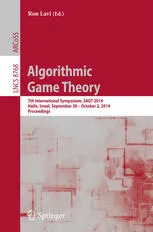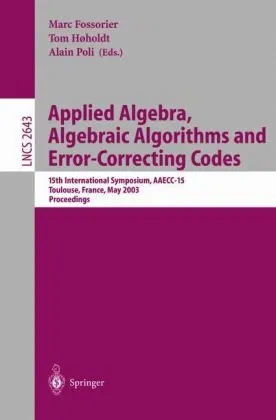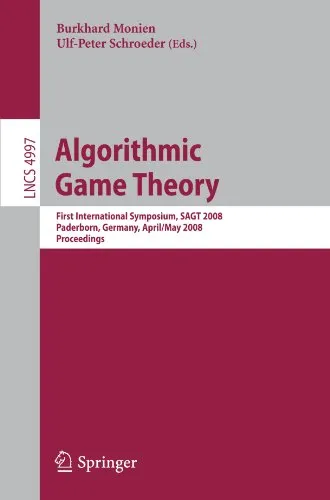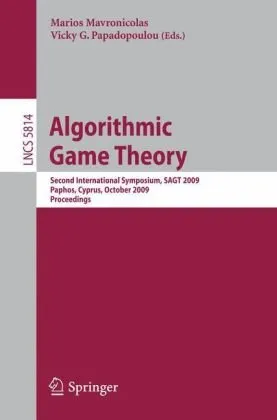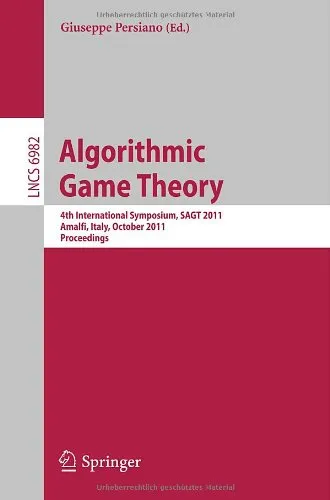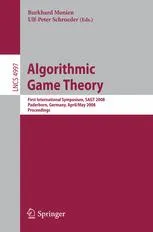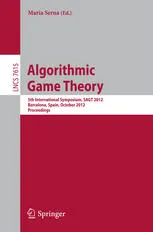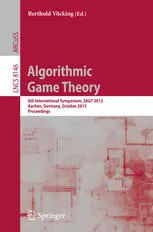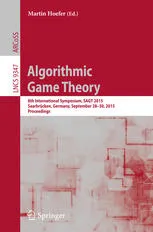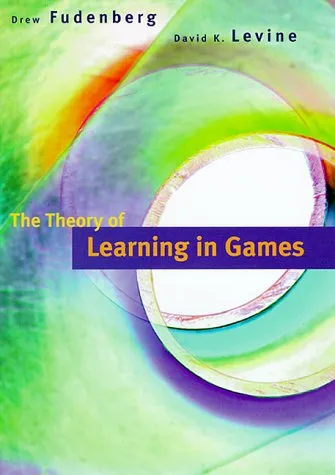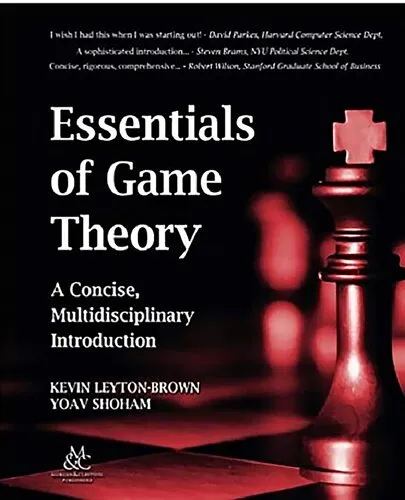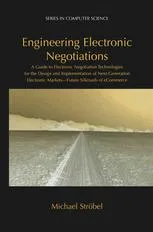Algorithmic Game Theory: 7th International Symposium, SAGT 2014, Haifa, Israel, September 30 – October 2, 2014. Proceedings
4.0
Reviews from our users

You Can Ask your questions from this book's AI after Login
Each download or ask from book AI costs 2 points. To earn more free points, please visit the Points Guide Page and complete some valuable actions.Related Refrences:
Introduction to 'Algorithmic Game Theory: 7th International Symposium, SAGT 2014'
The book 'Algorithmic Game Theory: 7th International Symposium, SAGT 2014, Haifa, Israel' serves as a comprehensive collection of pioneering research and academic insights presented at the SAGT 2014 conference. Held in Haifa, Israel, from September 30 to October 2, 2014, this event brought together thought leaders, researchers, and practitioners to discuss the evolving interface between algorithms and game theory. Explored across its pages is a wide array of topics that delve into the mathematical and computational underpinnings of game-theoretical concepts and their applications in artificial intelligence, economics, decision-making processes, and beyond.
As algorithmic game theory continues to grow as a critical area of interdisciplinary research, this book provides an essential snapshot of the state of the art as of 2014. Edited by Ron Lavi, this volume brings together carefully selected papers that strike a balance between theoretical rigor and practical applicability, catering to academics, students, and professionals alike.
Detailed Summary of the Book
The proceedings of SAGT 2014 comprise papers grouped into several thematic areas, each reflecting the latest advances and open challenges at the intersection of algorithms and game theory. Core topics include:
- Design and analysis of game-theoretic algorithms in networked environments;
- Mechanism design with a focus on complexity and efficiency;
- Computational social choice and collective decision-making;
- Equilibrium computation and dynamics in games;
- Applications of algorithmic game theory in markets, auctions, and resource sharing.
These sessions aim to address critical questions such as: How can algorithms guide rational agents in a shared environment? What mechanisms can ensure fairness, efficiency, and stability in multi-agent settings? What computational barriers exist in achieving optimal outcomes? By blending theoretical explorations with applied perspectives, the book highlights the role of algorithmic game theory in shaping digital economies, blockchain technologies, and AI systems.
Key Takeaways
Below are some significant takeaways from the book:
- Bridging Theory and Practice: The book emphasizes the practical implications of game-theoretic solutions for real-world problems in auction theory, logistics, and network design.
- Interdisciplinary Applications: Readers will appreciate how algorithmic game theory interconnects with economics, AI, and theoretical computer science, offering diverse applications and insights.
- Cutting-edge Research: Each paper presented offers foundational advancements in its respective area, making the book a valuable resource for those pursuing novel research directions.
- Equilibrium under Complexity: Discussions of equilibria in complex systems provide valuable lessons on computational feasibility and convergence.
- Future Challenges: The volume not only focuses on existing solutions but also highlights potential roadblocks and unanswered questions for future exploration.
Famous Quotes from the Book
While the book is primarily technical, several passages stand out for their profound insights into the nature of algorithms and game theory:
"The role of computation in decision-making is not merely to find answers but to shape the incentives of all participants in the system."
"In a world of rational agents, understanding behavior is as important as constructing mechanisms."
Why This Book Matters
The significance of this book lies in its ability to offer a structured, detailed, and innovative view of a field that continues to revolutionize multiple industries. As digital platforms and networks grow increasingly sophisticated, understanding the game-theoretic underpinnings of multi-agent systems becomes essential.
This book equips its readers with tools to navigate complex scenarios such as online market mechanisms, shared resource allocation, and multi-party optimization. Its relevance spans researchers eager to push the boundaries of theory, engineers designing decentralized systems, and academics mentoring the next generation of scholars.
Furthermore, by capturing the ideas and discussions that took place at SAGT 2014, this book fosters a deeper appreciation of international collaboration in solving pressing global challenges. Ultimately, it serves as a vital snapshot in the evolution of algorithmic game theory and an essential reference point for future developments.
Free Direct Download
You Can Download this book after Login
Accessing books through legal platforms and public libraries not only supports the rights of authors and publishers but also contributes to the sustainability of reading culture. Before downloading, please take a moment to consider these options.
Find this book on other platforms:
WorldCat helps you find books in libraries worldwide.
See ratings, reviews, and discussions on Goodreads.
Find and buy rare or used books on AbeBooks.
1313
بازدید4.0
امتیاز0
نظر98%
رضایتReviews:
4.0
Based on 0 users review
Questions & Answers
Ask questions about this book or help others by answering
No questions yet. Be the first to ask!
